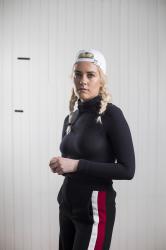Definition:
malaise (noun; maˈleɪz)
- A feeling of general bodily discomfort, fatigue or unpleasantness, often at the onset of illness.
- An ambiguous feeling of mental or moral depression.
- Ill will or hurtful feelings for others or someone.
Agony, disease, resentment: probably not the first things that come up when you Google “rap”. They’re also not words you’d use to describe Dýrfinna Benita when you first meet her. Soft-spoken, eccentric, funny, perceptive—she’s anything but a cruel Debbie Downer. That said, bump her tracks and you’ll hear a different story. Over heavy beats, the rapper pushes honest aggression, dark stories, and all round horror—a Sharon Needles for the hip-hop crowd.
So nod your head and bow down to Countess Malaise. Welcome to her kingdom of turnt rap gore.
The genesis of a ruler
“There’s this comic book character from the 1960s who I find so sexy and badass. She’s sort of a spy or a superhero, but basically just a chick with a gun. Her name is Modesty Blaise.” The Countess tells me as we sit down next to two gear-clad tourists riffling through city maps. It’s an incongruous environment—Dýrfinna seems more fitted to an underground industrial club than a noisy café. Unfussed, she continues: “Well, one day I was making a song with my friend Lord Pusswhip and he asked me what I wanted to call myself. I immediately said Modesty Blaise and he rhymed back Countess Malaise. I looked up the definition and I was like ‘damn that fits’.” Thus, Countess Malaise was born.

The Modesty Blaise is just one of many bizarre influences on her music. Dýrfinna immediately strikes you as one of those people whose CD rack or internet history you’d want to rifle through—everything she’s into is unusual, unpredictable, and fascinating. “I love the Powerpuff Girls. I am totally a Buttercup so she’s been a huge inspiration to me. I even have collectibles of them.” She laughs before pausing. “David Lynch too. Also Junji Ito. He’s a manga artist whose work is dark and fucked up, but in a good way. His stuff makes you think, which is what I want to do.”
The exodus of an artist
Ito’s aesthetic is easily seen in her music. Take her song, ‘Kvalin’: “‘The lyrics are really dark. It’s about all the violence I’ve been through. But at the same time, the song is so turnt.” It’s true—in concert this is one of the tracks everyone goes crazy for. “So, it feels empowering and I don’t feel sad when I rap it, even though the lyrics are kind of fucked up, which is really amazing.”
Dýrfinna touches on dark topics in an honest way. “I think it’s OK, it’s not lame to talk about your feelings and what you’ve been through. Depression, stuff like that, they’re always looked away from and people say, ‘Oh, that’s too much. You’re telling too much.’ but I think people should be able to express themselves.” She shrugs. “Rap is poetry. It’s art.”
Dýrfinna is currently doing a video course in Amsterdam, but she also has a background in drawing, painting, graffiti, and poetry. “In general, I feel like my work is honest and violent. I don’t want to put too many labels on it, but that’s how I would start.” She started rapping around two years ago and dropped her first song, ‘Goth Bitch’ a year ago. It’s a freaky song, complete with a freaky video—horror music in the vein of ‘Get Your Gunn’ by Marilyn Manson, but definitely not Insane Clown Posse. It’s also a total 180° from anything else in the Icelandic hip hop community.

“Everyone does different stuff here, but we all want to collab with each other. I just did a song with Cyber and one with Geisha Cartel and I’m going to do more. Entering the Reykjavík rap scene has been really cool. I’m really happy that I get to be a part of something so amazing.” While for now, the Countess says she’s doing darker stuff, she would also love to explore more psychotically happy stuff or plain old pop. “At the base though, I’m really dark. I like dark gory movies and dark music, and I have a dark life.” She smiles—a dark smile. “Everything is dark really.”
Buy subscriptions, t-shirts and more from our shop right here!
















